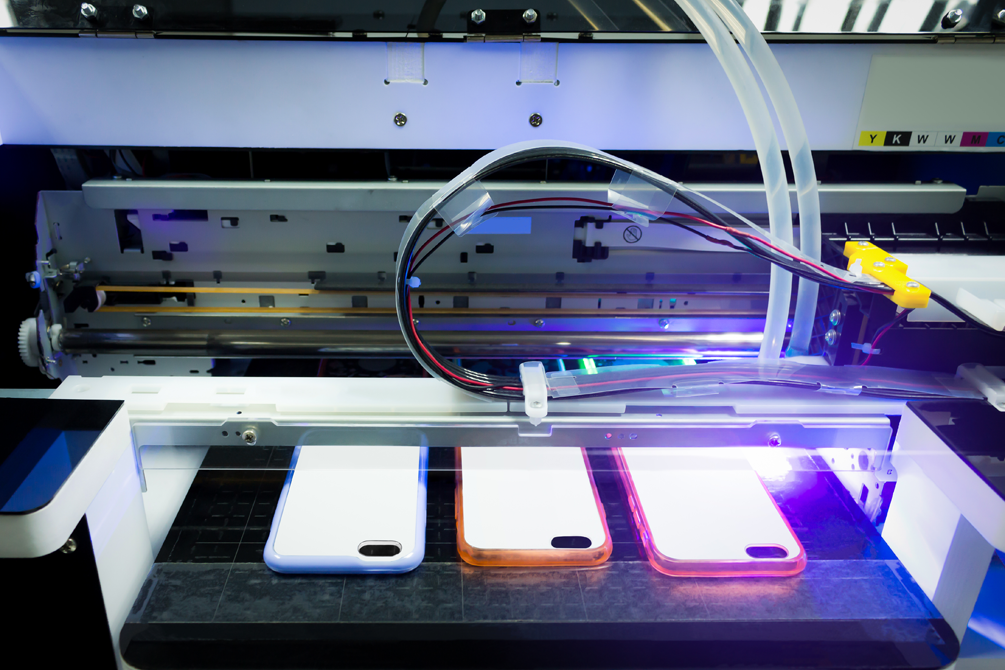
The concept of Ultraviolet inks is not new to the market. Nowadays, more and more use-cases and applications of UV inks in the screen-printing industry are coming into existence. This is because there are more advantages of UV than disadvantages. They’re environment-friendly, and their production is possible at a faster rate. It seems UV is the best choice for many, if not most, in today’s screen-printing environment.
So, if you’re considering screen printing as your major or complementary business, UV inks can help open up new possibilities. It is worth taking time to learn about UV inks and come up with a plan to augment your existing business. Hence, if you are into the screen-printing business and planning to branch out to expand your print line-up, UV ink is worth the consideration. In this guide, we are going to take a nosedive into the know-hows of UV screen printing technology. Let’s dive deeper!
What is UV Screen Printing?
UV Screen Printing usually refers to the process of commercial printing carried out using ultraviolet technology. The UV printing process involves special inks that dry quickly in the presence of UV light. As the paper passes through the printing press and it receives wet ink. The ink dries instantly in the presence of UV light. This is also beneficial for the output quality as the ink does not have the chance to seep or spread. Hence, we receive a sharper and better output compared to the results of traditional printers.
How Does UV Ink Work?
The UV ink consists of solid monomers and oligomers molecules as well as pigment and performance additives, photoinitiator, etc. The photoinitiator, which when exposed to UV light, releases free radicals. This enables the molecules to bond together and create a solid ink layer. The ink sits on the top of the substrate instead of settling in it. This makes it ideal for printing on smooth surfaces.
Sell more with customizable products. Make online shopping experience engaging with product customization as an added USP!
Advantages of UV Screen Printing
Today, UV ink dominates the screen-printing market. The market for UV cured printing inks is about to grow at a CAGR of more than 5.3% until 2026. Here are some reasons for its growing popularity and the advantages of UV screen printing ink.
- Instant Curing
UV ink offers instant curing properties. It cures as soon as it is exposed to UV light. This means companies can ensure faster production. The curing process reduces the overall production time. So, all you need to do is take care of the availability of the curing units and materials, and you have your UV prints ready!
- No Over-Curing
The curing window for UV inks is more forgiving than the solvent-based inks. It is difficult to over-cure UV inks as compared to solvent-based inks.
- No Hazardous Fumes
The traditional water or solvent-based inks are not as eco-friendly as the UV screen printing ink. UV inks emit no volatile organic compounds during curing, making them extremely environment-friendly compared to their solvent-based counterpart.
- UV Inks Do Not Dry on the Screen
Another advantage of UV screen printing ink is that it does not dry on the screen. Solvent-based inks continue to increase the viscosity as you use them. This is because the solvent keeps evaporating continuously. UV inks don’t increase in viscosity. Hence, you do not have to clean your screens in the middle of the production process.
- Crystal-Clear Detailing
UV screen printing ink offers a crystal-clear detailing of the designs. During screen printing with UV ink, suppliers can achieve good quality graphic details. This is because UV inks are thin as compared to solvent-based inks.
- Cost-Effective
UV inks are cost-effective even though they cost more. Neither do they require any solvent, nor do they dry out on the screen like water-based inks. Hence, less ink wastage. This means you’ll be spending more on ink, but there will be no wastage, eventually making the whole process cost-effective.
- Lower Energy Usage
The screen-printing shops using UV ink are less likely to save energy. This is because UV inks use light technologies like LED lights to cure. Whereas the solvent or water-based inks use large conveyor dryers.
- Speed and Efficiency
UV screen printing saves a lot of time before it moves forward to packing and the logistics department. You can ship the prints obtained through UV ink screen printing the minute they emerge from the curing unit. This ensures little to no waiting time for prints to dry. Companies no longer require any storage racks to hold substrates for drying. They also save on investing in heavy equipment like bulky heat-drying machines and so on.
- Minimizing Processes
Not only does it save energy, time, and resources, but it also minimizes the processes. For example, while printing multicolor jobs, you can print the second color almost immediately. This is highly beneficial for high-production industries that can print several colors at once. All they need to do is just by-pass the prints through intermediate UV curing stages.
So, these were the advantages of UV screen printing, now let us have a look at some of the current applications and drawbacks of this technology.
Applications of UV Screen Printing
UV Screen printing is a fantastic and lucrative technology. Many industries use it currently, and there are so many applications. A wide variety of substrate printing, including paper, glass, plastics, paperboard, metals, fabrics, and so on, is popular nowadays.
Currently, some popular applications are UV inks in screen printing for nameplates, signage, CDs, etc. The primary applications of UV ink printing are industrial applications and some automotive artworks as well. UV ink offers certain products that are not possible to obtain using traditional inks. For the screen-printing entrepreneurs just starting their businesses, investing in UV-ink-based products provides a vast opportunity for lucrative profits. The existing screen-printing businesses require an additional capital investment for equipment to branch out UV screen printing as the equipment for both. And now more than ever is the best time to do so.
Launch Web to Print Store now! Start selling personalized products with a brand new website.
Few Drawbacks
Although utilizing UV inks poses many advantages, it is not the answer for all applications. There are some drawbacks of UV screen printing ink too. UV Screen printing ink does not provide the opacity of solvent-based inks. So, if you are looking forward to using a plastic substrate, it can create a problem for you. A yellow color may not keep its color over a dark black or blue plastic substrate. Some plastic substrates do now accept UV inks at all.
There are challenges with using UV inks with special processes like elongation for in-mold decorating and vacuum forming applications. Then there are problems that certain polyesters must print with special solvent-based inks. Solvent-based inks generally work better for these processes. However, new UV production happens practically on a daily basis with properties that were previously unavailable. So maybe one day we’ll be able to find alternatives for these drawbacks too.
Over to You
So now, we all can agree on the fact that UV curing inks can make a big difference to traditional print operations. Regardless of a few drawbacks, UV screen printing technology is turning out to be a massive success across the world, especially in the parts where production speed is a critical criterion.
So, this was all about UV screen printing, its advantages, and its applications. Screen printing with UV ink is not a tricky one and is also beneficial for the environment. For any other questions related to UV screen printing, UV screen printing ink, and so on, you can check out our blogs at our information station or directly contact our experts.
Looking for a Product Designer Tool for your online store? Take a personalized tour of the product to see how it best matches your needs!
All product and company names are trademarks™, registered® or copyright© trademarks of their respective holders. Use of them does not imply any affiliation with or endorsement by them.

![Why Box Design Software is Essential for Your Custom Box Business [Plus Latest Industry Innovations] blog img](https://www.printxpand.com/wp-content/uploads/2023/08/Overcoming-Feature-Image-40364.jpg)

